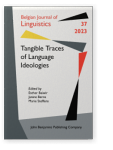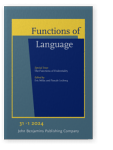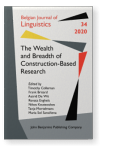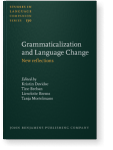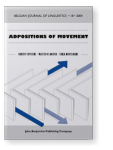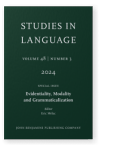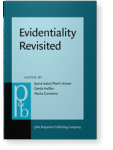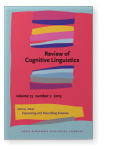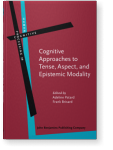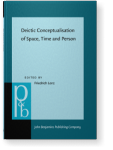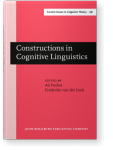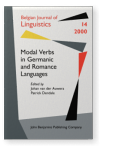Tanja Mortelmans
List of John Benjamins publications for which Tanja Mortelmans plays a role.
Yearbook
Journals
ISSN 0929-998X | E-ISSN 1569-9765
Titles
The Wealth and Breadth of Construction-Based Research
Edited by Timothy Colleman, Frank Brisard, Astrid De Wit, Renata Enghels, Nikos Koutsoukos, Tanja Mortelmans and María Sol Sansiñena
[Belgian Journal of Linguistics, 34] 2020. vii, 382 pp.
Subjects Theoretical linguistics
Grammaticalization and Language Change: New reflections
Edited by Kristin Davidse, Tine Breban, Lieselotte Brems and Tanja Mortelmans
[Studies in Language Companion Series, 130] 2012. viii, 342 pp.
Subjects Functional linguistics | Historical linguistics | Theoretical linguistics
Adpositions of Movement
Edited by Hubert Cuyckens, Walter De Mulder and Tanja Mortelmans
[Belgian Journal of Linguistics, 18] 2004. viii, 323 pp.
Subjects Theoretical linguistics
2024 Frequency differences in reportative exceptionality and how to account for them: A case study on verbal reportative markers in French, Dutch and German Evidentiality, Modality and Grammaticalization, Mélac, Eric (ed.), pp. 682–722 | Article
Reportative evidential markers are – in contrast to other evidential markers – compatible with distancing interpretations, in which the speaker denies the truth of what is being reported. This exceptional behaviour of reportatives is termed ‘reportative exceptionality’ (AnderBois 2014). In this… read more
2020 Introduction: The wealth and breadth of construction-based research The Wealth and Breadth of Construction-Based Research, Colleman, Timothy, Frank Brisard, Astrid De Wit, Renata Enghels, Nikos Koutsoukos, Tanja Mortelmans and María Sol Sansiñena (eds.), pp. 1–4 | Introduction
2017 Seem-type verbs in Dutch and German: Lijken, schijnen & scheinen Evidentiality Revisited: Cognitive grammar, functional and discourse-pragmatic perspectives, Marín-Arrese, Juana I., Gerda Haßler and Marta Carretero (eds.), pp. 123–148 | Article
This paper addresses the German seem-type verb scheinen and its Dutch ‘equivalents’ lijken and schijnen. On the basis of an analysis of spoken corpus data, it is shown that these verbs differ with respect to three parameters: 1) their constructional preferences 2) their evidential potential and 3)… read more
2015 Review of Butler & Gonzálvez-García (2014): Exploring Functional-Cognitive Space Expressing and Describing Surprise, Celle, Agnès and Laure Lansari (eds.), pp. 507–514 | Review
2012 Introduction: New reflections on the sources, outcomes, defining features and motivations of grammaticalization Grammaticalization and Language Change: New reflections, Davidse, Kristin, Tine Breban, Lieselotte Brems and Tanja Mortelmans (eds.), pp. 1–36 | Article
2011 Some remarks on the role of the reference point in the construal configuration of “more” and “less” grounding predications Cognitive Approaches to Tense, Aspect, and Epistemic Modality, Patard, Adeline and Frank Brisard (eds.), pp. 137–158 | Article
In Cognitive Grammar, grounding predications are by definition highly grammaticalized elements. As grammaticalization is a gradient phenomenon, this chapter argues for a more gradual view on grounding. It is proposed that a particular linguistic unit may show a weaker or a stronger degree of… read more
2004 Introduction Adpositions of Movement, Cuyckens, Hubert, Walter De Mulder and Tanja Mortelmans (eds.), p. | Miscellaneous
2003 7. The ‘subjective’ effects of negation and past subjunctive on deontic modals: The case of German dürfen and sollen Deictic Conceptualisation of Space, Time and Person, Lenz, Friedrich (ed.), pp. 153–182 | Article
2000 Konjunktiv II and Epistemic Modals in German: A Division of Labour Constructions in Cognitive Linguistics: Selected papers from the Fifth International Cognitive Linguistics Conference, Amsterdam, 1997, Foolen, Ad and Frederike van der Leek (eds.), pp. 191 ff. | Article
2000 On the 'Evidential' Nature of the 'Epistemic' Use of the German Modals müssen and sollen Modal Verbs in Germanic and Romance Languages, Auwera, Johan van der and Patrick Dendale (eds.), pp. 131–148 | Article
Abstract. The difference with respect to the kind of evidence evoked by the so-called 'epistemic' uses of the German modals müssen and sollen is argued to affect the epistemic contribution of both verbs in a crucial way. With quotative sollen, a genuine subjective-epistemic moment (which should not… read more
